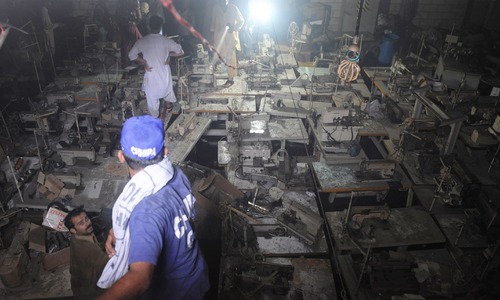ON Sept 11, 2012, 260 trapped workers were burnt or suffocated to death inside a garment factory in Baldia Town, Karachi. The fire was so intense that a number of bodies were burnt beyond recognition, and 17 workers were buried unidentified.
The event is remembered as the deadliest industrial fire in Pakistan’s history. The majority of the dead, including 24 women, were under the age of 30. Many were poor migrants from other parts of the country.
The Ali Enterprises fire brought to light the poor working conditions prevalent in the garment and textile industry, which is the largest exporting sector in Pakistan, earning $13 billion annually. The tragedy not only reflected negligence on a national level, but also the indifference of global buyers.
Employing over 1,500 workers, the factory was supplying over 80 per cent of its production output to the German textile discount chain KiK. It was not registered with the Sindh Labour Department, let alone visited by any labour inspector to check its health and safety conditions.
Occupational safety risks still persist following the Baldia tragedy.
Multiple theories still circulate about the actual cause of the fire, while a criminal case in the court is yet to be decided. But reports are unanimous that the human losses could have been avoided had the doors not been locked and windows not soldered shut with iron grills. There was no proper fire alarm system, nor any emergency exit points at the site.
Labour organisations, along with their global partners, successfully chased the German buyer. After four years of campaigning and negotiations, KiK agreed to pay long-term compensation worth $5.15 million to the victims’ families. The agreement signed in 2016 is the largest out-of-court settlement with an individual buyer in the history of industrial accidents. The company had earlier paid an amount of $1m as an immediate relief, distributed among the victims’ families through the Sindh High Court. The long-term compensation is being distributed to the heirs of the victims and survivors as monthly pensions since January 2017. A multi-stakeholder oversight committee governs the scheme, which is being executed by the Sindh Employees Social Security Institution.
The scheme has set a precedent for compensation in such industrial accidents not only in Pakistan, but globally as well. The process and calculations followed the International Labour Organisation standards under Convention 121.
The pension is on top of government and private grants extended to the victims’ families soon after the accident. On average, the victims’ families received Rs1.5m as lump-sum compensation.
Unfortunately, progress on improving the health and safety conditions at the workplace to prevent such accidents in the future is far from impressive.
The Sindh government only recently notified an Occupational Safety and Health Council in August 2019 under the Sindh Occupational Safety and Health Act, 2017. However, the situation on ground is almost the same as it was seven years ago.
The labour inspection system remains abysmal, with only around 100 inspectors to cover the entire province and its 14 million-strong work force. There are no efforts on record to overhaul the rotten system of labour inspection, which is marred by allegations of corruption and incompetence.
More than half the factories in Sindh remain unregistered. The labour department has been able to register only 9,800 factories with 450,000 workers – this, in a province that has the largest industrial base in the country. Registered factories are not properly inspected and verified for compliance on labour standards.
The situation is the same in other parts of the country. The Clean Clothes Campaign, a global network of trade unions and NGOs campaigning for better working conditions in the textile sector, has recorded 100 deaths at workplaces in Pakistan due to unsafe conditions since the Baldia fire. These are in addition to hundreds of minor incidents in which poor workers were injured.
The Labour Force Survey 2017-18 states that one out of 25 workers in Pakistan is affected by occupational health and safety risks. The number is higher than many other countries in the region.
And progress on providing justice to victims, in terms of identifying and prosecuting those responsible for this tragedy, is very slow due to loopholes in the judicial system. Initially, the owners were booked for murder, followed by charges of negligence. Later, multiple JITs were formed and the alleged perpetrators booked under anti-terror laws. However, the heirs of the victims still await justice as no one has been sentenced to date.
Seven years on, there is still much to learn from the Baldia fire. Apart from quick trials, there is a need for drastic reforms in working conditions of factories, in order to prevent such tragedies and ensure that more lives are not lost to criminal apathy.
The writer works at the Pakistan Institute of Labour Education & Research.
Published in Dawn, September 12th, 2019














































